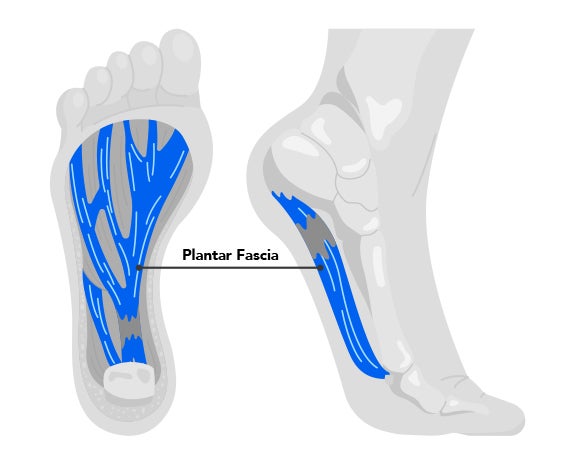Plantar Fasciitis Symptoms, Causes and Treatment
A common foot complaint is plantar fasciitis. Learn what causes it and how to identify and treat it.

What is plantar fasciitis?
Plantar fasciitis is a common condition that occurs when your plantar fascia, the tissue running along the sole of your foot, is irritated or inflamed. This condition causes pain when you put pressure on your foot.
The plantar fascia is a thick band of tissue that connects your heel to your toes.

What does plantar fasciitis feel like?
While not all foot pain can be diagnosed as plantar fasciitis, there are several symptoms that will help you distinguish it from other conditions or injuries. Plantar fasciitis symptoms include:
A stabbing pain near your heel
A dull, constant ache
Swelling around your heel
Stiffness in your foot
Pain in the arch of your foot
Most painful steps are first steps of the day when first put pressure on your foot or feet or after resting for an extended period of time.
Treating Plantar Fasciitis at Home
With proper care and treatment, it is possible to reduce your symptoms and lessen the chance you will experience plantar fasciitis again. Home treatment often works for plantar fasciitis, but if your symptoms are severe or will not go away, it is best to seek help from a medical provider.
Rest
The first method of treatment you should pursue when experiencing any kind of foot pain is rest. Sit or lay down to remove the pressure on your foot. You should limit walking, standing and exercise as much as possible. Resting your foot will help reduce your symptoms as pressure and stress often exacerbate them, and sometimes cause the condition in the first place.
Stretching
Once you have rested your foot, some light stretching may help. Tight muscles in your legs can exacerbate plantar fasciitis. A medical provider will be able to help you understand where your foot is experiencing the most stress and what stretches will be the most helpful.
Medication
If your pain persists, over-the-counter non-steroidal anti-inflammatory drugs (NSAIDs) like aspirin or ibuprofen may help. When paired with rest, these medications can reduce inflammation and pain in your foot.
More Foot Support
Plantar fasciitis is a condition that can be reoccurring. If you find yourself with consistent foot pain from plantar fasciitis, additional support in your day may be needed. Changing your shoes, where you exercise, adjusting the type of exercises you partake in and sleep supports can all keep plantar fasciitis at bay. Medical providers, physical therapists and personal trainers can all offer advice and guidance on modifying your routines.
Visit WellNow for Plantar Fasciitis
If you are experiencing pain in your foot, WellNow’s dedicated medical team will provide comprehensive care along with diagnosis and treatment to help prevent further issues — both in-person and via virtual care.
Reserve your spot at a WellNow clinic near you.
Start a virtual visit.
WellNow Urgent Care is a series of urgent care clinics and virtual care serving the Midwest and Northeastern United States in Illinois, Indiana, Michigan, New York, Pennsylvania and Wisconsin.
Information contained in this blog is for informational or educational purposes only and does not substitute professional medical advice or consultations with healthcare professionals. The content is not meant to be complete or exhaustive or to apply to any specific individual's medical condition. Always refer to the personalized information given to you by your doctor or contact us directly.
